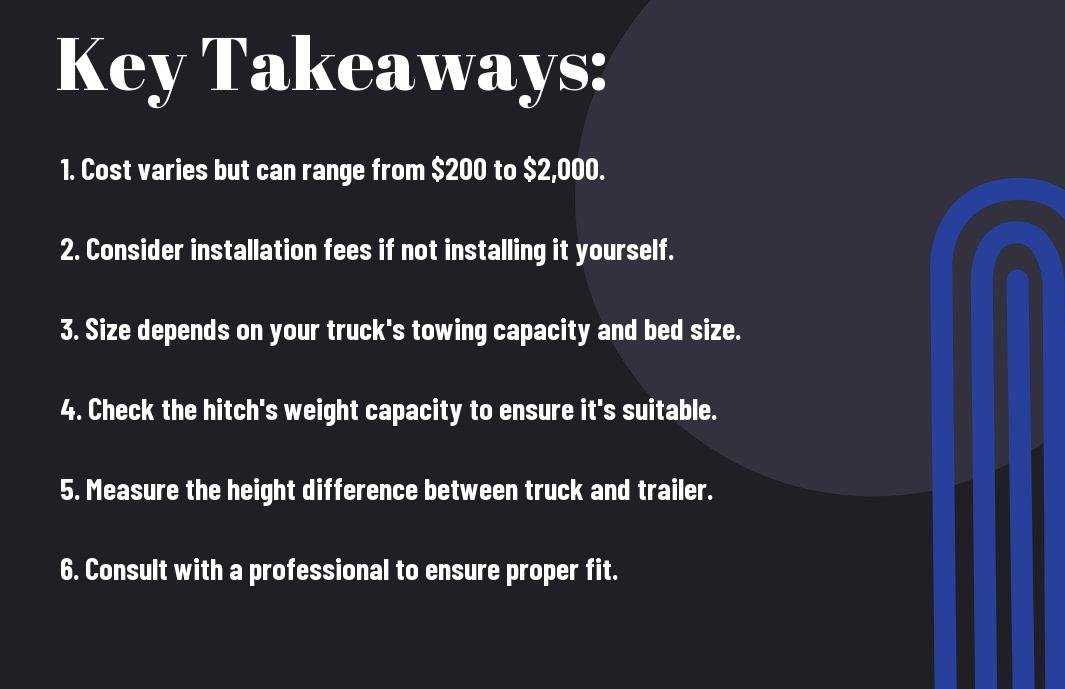Have you ever wondered how much it costs to install a 5th wheel hitch on your vehicle? Maybe you’re also perplexed about what size 5th wheel hitch you need for your trailer. Well, you’re in the right place. Installing a 5th wheel hitch can cost you anywhere from $300 to $1500, depending on the type of hitch and the complexity of installation. When it comes to determining the right size 5th wheel hitch, it’s crucial to consider the weight and height of your trailer, as well as the towing capacity of your vehicle. Choosing the wrong size hitch can lead to dangerous towing situations and potential accidents. In this blog post, we’ll discuss the various factors that determine the cost of installing a 5th wheel hitch, and provide you with tips on how to determine the correct size hitch for your towing needs.
Key Takeaways:
- Cost varies: The cost of installing a 5th wheel hitch can range from $200 to $800, depending on the type, brand, and complexity of the installation.
- Do research: Research different brands and types of 5th wheel hitches to find the best one for your towing needs and budget.
- Consider installation: Factor in the cost of professional installation if you’re not comfortable installing the hitch yourself.
- Weight capacity: Determine the weight capacity needed for your 5th wheel hitch based on the trailer you plan to tow.
- Bed type: Consider the type of truck bed you have, as this will determine the size and style of 5th wheel hitch you need.
- Measurements: Take precise measurements of your truck bed to ensure you select the correct size 5th wheel hitch.
- Consult a professional: If you’re unsure about what size 5th wheel hitch you need, consult with a professional or the manufacturer for guidance.

Understanding 5th Wheel Hitch Costs
Some factors can influence the cost of putting in a 5th wheel hitch, including the type of vehicle you have, the size of the hitch, and whether you choose to install it yourself or hire a professional. Understanding these factors can help you determine the total cost and make an informed decision.
Factors Influencing Installation Cost
When determining the cost of installing a 5th wheel hitch, there are several factors to consider. The size and weight capacity of the hitch you need for your specific trailer will impact the overall cost. Additionally, the make and model of your vehicle will play a role, as some vehicles may require additional modifications to accommodate the hitch. The complexity of installation and any necessary customizations or adjustments can also influence the final cost. The quality of the hitch and installation materials will impact the price as well. Finally, the labor rates of the professional installer or dealership will contribute to the total cost.
The factors influencing installation cost are numerous, and it is essential to take all of them into consideration when planning for the installation of your 5th wheel hitch. The quality of the hitch and materials, the complexity of the installation, and the make and model of your vehicle all play a crucial role in determining the overall cost. The labor rates of professionals or dealerships will add to the final price. The more comprehensive your understanding of these factors, the better prepared you will be to determine the total cost.
Cost Comparison of DIY vs. Professional Installation
When it comes to installation, you have the option to either install the 5th wheel hitch yourself or hire a professional. Consider the following cost comparison between DIY and professional installation:
| DIY Installation | Professional Installation |
| You can save on labor costs by installing the hitch yourself, but may need to invest in specialized tools and spend more time on the installation process. | A professional installer has the expertise and tools to ensure a proper and efficient installation, but will come with additional labor costs. |
| If you are confident in your skills and have the necessary tools, DIY installation may be a cost-effective option. | Professional installation provides peace of mind with a warranty on the work, but comes with a higher upfront cost. |
Ultimately, the choice between DIY and professional installation will depend on your skill level, available time, and budget. Each option has its pros and cons, so consider your priorities when making a decision for your 5th wheel hitch installation.
Selecting the Correct 5th Wheel Hitch
Unlike standard trailer hitches, 5th wheel hitches are designed for heavy-duty towing and can handle much larger loads. When selecting the correct 5th wheel hitch for your vehicle and trailer, it’s important to consider several key factors to ensure safe and efficient towing. From weight ratios and towing capacity to matching the hitch size to your vehicle and trailer, each aspect plays a crucial role in determining the right 5th wheel hitch for your specific needs.
Weight Ratios and Towing Capacity
One of the most critical factors to consider when selecting a 5th wheel hitch is the weight ratios and towing capacity. You must ensure that the hitch you choose can safely handle the weight of your trailer, including the cargo it will be carrying. Exceeding the towing capacity of your hitch can lead to dangerous situations, including loss of control, excessive strain on your vehicle’s engine, braking issues, and potential accidents. It’s crucial to carefully review the manufacturer’s specifications for both your vehicle and the 5th wheel hitch to ensure the weight ratios and towing capacity are compatible.
Matching Hitch Size to Your Vehicle and Trailer
Matching the hitch size to your vehicle and trailer is another essential consideration. It’s not simply a matter of selecting any 5th wheel hitch that fits your vehicle’s receiver. The hitch must also be compatible with the size and weight of your trailer. Using a hitch that is too small or too large for your trailer can result in unsafe towing conditions and potential damage to your vehicle or trailer. You must carefully match the hitch size to your vehicle’s receiver and the size of your trailer to ensure a secure and stable towing experience.
Installation Process
Despite the initial cost, installing a 5th wheel hitch can save you money in the long run by allowing you to tow heavy loads efficiently. The installation process involves several steps and requires attention to detail and the use of the right tools and materials.
Required Tools and Materials
Before you begin the installation process, you will need to gather a few essential tools and materials. These may include a torque wrench, socket set, drill, mounting brackets, hardware, and a 5th wheel hitch designed for your specific towing capacity. Make sure to carefully read the installation instructions provided by the manufacturer to ensure that you have all the necessary tools and materials before starting the installation.
Step-by-Step Installation Guide
Once you have all the required tools and materials, you can start the step-by-step installation of your 5th wheel hitch. Below is a summarized guide to help you through the process:
StepDescription
1
Prepare the truck bed
2
Install mounting brackets
3
Attach the hitch head
4
Secure the hitch in place
5
Double-check all connections
Important: Make sure to follow the manufacturer’s instructions carefully and double-check all connections to ensure that the hitch is securely installed. Be cautious when working with heavy equipment and use proper lifting techniques to prevent injury. Once the installation is complete, you will be ready to tow your 5th wheel trailer with confidence.
Maintenance and Safety
Now that you have your 5th wheel hitch installed, it’s important to understand the maintenance and safety procedures to ensure smooth and safe towing experiences. Regular maintenance and safety checks are essential to keep your hitch in top condition and to prevent accidents or breakdowns on the road.
Regular Maintenance Tips
As with any vehicle component, regular maintenance is key to ensuring the longevity and performance of your 5th wheel hitch. You should inspect the hitch for any signs of wear and tear, such as cracks, rust, or loose bolts. Additionally, make sure to lubricate the moving parts of the hitch regularly to prevent friction and wear. Checking the mounting hardware and ensuring it’s tight and secure is also important to prevent any accidents while towing. Lastly, it is crucial to have a professional inspect your 5th wheel hitch at least once a year to make sure everything is in proper working condition.
- Regularly inspect for wear and tear
- Lubricate moving parts
- Check mounting hardware
- Annual professional inspection
Though proper maintenance may seem like an inconvenience, the benefits of having a well-maintained 5th wheel hitch far outweigh the potential dangers and costs of neglecting it.
Safety Checks and Pre-Towing Inspection
Before hitting the road with your 5th wheel hitch, it’s essential to conduct thorough safety checks and pre-towing inspections. Inspect the hitch for any signs of damage, and ensure that it is securely attached to the truck. Check the brake and electrical connections to ensure everything is in working order. Additionally, verify that the weight distribution and sway control systems are properly set up to provide optimal towing stability. Furthermore, if you encounter any issues during your pre-towing inspection, it is crucial to address them immediately to avoid any potential hazards while on the road.
Conclusion
Conclusively, the cost of putting in a 5th wheel hitch can vary depending on the type of hitch and the installation process. You can expect to spend anywhere from $200 to $800 for the hitch itself, and installation costs can range from $200 to $500. As for determining the size of the 5th wheel hitch you need, it is crucial to consider the weight and size of your trailer. You should refer to your trailer’s owner’s manual or speak with a professional to identify the appropriate size and weight capacity for your 5th wheel hitch. Ensuring that you have the right hitch for your specific trailer is crucial for safety and stability while towing. It is highly recommended to consult with an experienced dealer or installer to make sure you are getting the correct hitch for your towing needs.
FAQ
Q: How much does it cost to put in a 5th wheel hitch?
A: The cost of installing a 5th wheel hitch can vary depending on the make and model of your vehicle, as well as the type of hitch you choose. On average, you can expect to pay anywhere from $500 to $1500 for the hitch and installation.
Q: How do I know what size 5th wheel hitch I need?
A: The size of the 5th wheel hitch you need is determined by the towing capacity of your truck and the weight of your trailer. You should consult your vehicle’s owner’s manual or speak with a professional to determine the appropriate size for your specific towing needs.
Q: Can I install a 5th wheel hitch myself?
A: While it is possible for some individuals to install a 5th wheel hitch themselves, it is not recommended unless you have experience with similar installations. Improper installation can lead to serious safety hazards, so it’s best to have a professional handle the installation.
Q: Are there different types of 5th wheel hitches?
A: Yes, there are several types of 5th wheel hitches available, including fixed, sliding, and gooseneck hitches. Each type is designed to accommodate different towing needs and vehicle configurations, so it’s important to choose the right one for your specific situation.
Q: Do I need any additional equipment when installing a 5th wheel hitch?
A: In addition to the 5th wheel hitch itself, you may need to purchase a mounting kit and any necessary hardware for installation. Some vehicles may also require modifications to the bed or frame in order to properly install the hitch.
